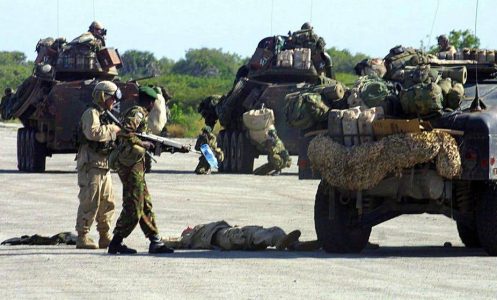
Al-Shabaab’s attacks come amid backdrop of West’s waning interest
Two significant attacks have been carried out by al-Shabaab in recent weeks. On 6 January 2020, the Somali-based terrorist group attacked a Kenyan military base close to the former coastal holiday destination of Lamu. The killing of a US service man and two US contractors in this attack inflicted the first ever American military combat losses inside Kenya.
The target of the assault, Manda Bay base, serves as a forward reconnaissance base for the US and is used for its drone warfare against al-Shabaab. The base is part of the American “train, assist, and enable” strategy for supporting African allies in their struggle against local organisations affiliated with Al Qaeda and Islamic State. It is also home to parts of the US 475th Expeditionary Air Base Squadron.
The other attack was on 28 December when a bomb went off at a checkpoint used by vehicles entering Somalia’s capital Mogadishu from the nearby city of Afgoye. Among the 85 killed in the attack were two Turkish engineers. Al-Shabaab claimed responsibility, saying the target had been a convoy of Turkish and Somali forces.
The two attacks, though different, shared some similarities: both targeted some of the group’s main enemies outside the region, Turkey and the US. Al-Shabaab’s global enemies have figured in its propaganda for more than a decade. Turks and Americans have been targeted before. And as recently as last year a US base in Somalia was targeted.
Al-Shabaab portrayed the Manda Bay attack as a direct response to the US administration’s designation of Jerusalem as the capital of Israel. The group further claimed that the attack was conducted under the “guidance and direction” of Al Qaeda leader Ayman al-Zawahiri.
It is significant that these attacks come at a time when the US – as well as other western countries such as France – are increasingly discussing scaling down their military efforts against African extremist organisations, as well as drawing in new partners to share their burden.
Moving pieces
Scaling back involvement is influenced by the failure to fully defeat any of the jihadist organisations on the continent. It is also informed by the fact that outfits such as al-Shabaab, Mali’s Jama’at Nasr al-Islam wal Muslimin, as well as the Islamic State in West Africa choose local or regional targets. This makes them a smaller threat to European and north American countries.
The third factor is the Trump administration’s insistence on sharing the international security burden among allies, and its reluctance to stage costly foreign interventions.
But the US and France still have each other, which could explain some changes in focus. For example, recent signals of a US scale down in West Africa but not in the Horn of Africa might be because of the French presence in that region. The US’s heavy investment in some countries in the Horn might also make it less willing to scale down its engagement in those countries.
But France’s unpopularity in the region, and the recent French talk of “burden sharing” mirroring the American rhetoric, signals that this solution also faces several dilemmas.
Source: The Conversation





